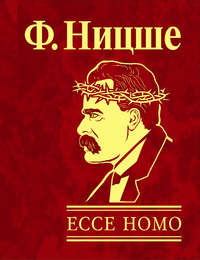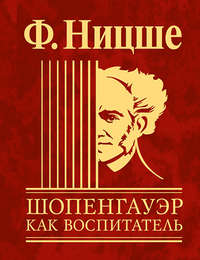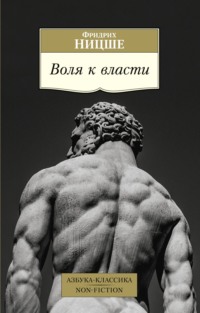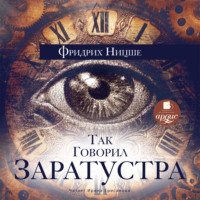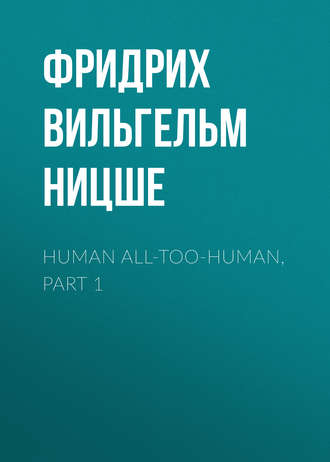 полная версия
полная версияHuman All-Too-Human, Part 1
A Portion of Our Ego As an Artistic Object. – It is a sign of superior culture consciously to retain and present a true picture of certain phases of development which commoner men live through almost thoughtlessly and then efface from the tablets of their souls: this is a higher species of the painter's art which only the few understand. For this it is necessary to isolate those phases artificially. Historical studies form the qualification for this painting, for they constantly incite us in regard to a portion of history, a people, or a human life, to imagine for ourselves a quite distinct horizon of thoughts, a certain strength of feelings, the prominence of this or the obscurity of that. Herein consists the historic sense, that out of given instances we can quickly reconstruct such systems of thoughts and feelings, just as we can mentally reconstruct a temple out of a few pillars and remains of walls accidentally left standing. The next result is that we understand our fellow-men as belonging to distinct systems and representatives of different cultures – that is, as necessary, but as changeable; and, again, that we can separate portions of our own development and put them down independently.
275Cynics and Epicureans. – The cynic recognises the connection between the multiplied and stronger pains of the more highly cultivated man and the abundance of requirements; he comprehends, therefore, that the multitude of opinions about what is beautiful, suitable, seemly and pleasing, must also produce very rich sources of enjoyment, but also of displeasure. In accordance with this view he educates himself backwards, by giving up many of these opinions and withdrawing from certain demands of culture; he thereby gains a feeling of freedom and strength; and gradually, when habit has made his manner of life endurable, his sensations of displeasure are, as a matter of fact, rarer and weaker than those of cultivated people, and approach those of the domestic animal; moreover, he experiences everything with the charm of contrast, and – he can also scold to his heart's content; so that thereby he again rises high above the sensation-range of the animal. The Epicurean has the same point of view as the cynic; there is usually only a difference of temperament between them. Then the Epicurean makes use of his higher culture to render himself independent of prevailing opinions, he raises himself above them, whilst the cynic only remains negative. He walks, as it were, in wind-protected, well-sheltered, half-dark paths, whilst over him, in the wind, the tops of the trees rustle and show him how violently agitated is the world out there. The cynic, on the contrary, goes, as it were, naked into the rushing of the wind and hardens himself to the point of insensibility.
276Microcosm and Macrocosm of Culture. – The best discoveries about culture man makes within himself when he finds two heterogeneous powers ruling therein. Supposing some one were living as much in love for the plastic arts or for music as he was carried away by the spirit of science, and that he were to regard it as impossible for him to end this contradiction by the destruction of one and complete liberation of the other power, there would therefore remain nothing for him to do but to erect around himself such a large edifice of culture that those two powers might both dwell within it, although at different ends, whilst between them there dwelt reconciling, intermediary powers, with predominant strength to quell, in case of need, the rising conflict. But such an edifice of culture in the single individual will bear a great resemblance to the culture of entire periods, and will afford consecutive analogical teaching concerning it. For wherever the great architecture of culture manifested itself it was its mission to compel opposing powers to agree, by means of an overwhelming accumulation of other less unbearable powers, without thereby oppressing and fettering them.
277Happiness and Culture. – We are moved at the sight of our childhood's surroundings, – the arbour, the church with its graves, the pond and the wood, – all this we see again with pain. We are seized with pity for ourselves; for what have we not passed through since then! And everything here is so silent, so eternal, only we are so changed, so moved; we even find a few human beings, on whom Time has sharpened his teeth no more than on an oak tree, – peasants, fishermen, woodmen – they are unchanged. Emotion and self-pity at the sight of lower culture is the sign of higher culture; from which the conclusion may be drawn that happiness has certainly not been increased by it. Whoever wishes to reap happiness and comfort in life should always avoid higher culture.
278The Simile of the Dance. – It must now be regarded as a decisive sign of great culture if some one possesses sufficient strength and flexibility to be as pure and strict in discernment as, in other moments, to be capable of giving poetry, religion, and metaphysics a hundred paces' start and then feeling their force and beauty. Such a position amid two such different demands is very difficult, for science urges the absolute supremacy of its methods, and if this insistence is not yielded to, there arises the other danger of a weak wavering between different impulses. Meanwhile, to cast a glance, in simile at least, on a solution of this difficulty, it may be remembered that dancing is not the same as a dull reeling to and fro between different impulses. High culture will resemble a bold dance, – wherefore, as has been said, there is need of much strength and suppleness.
279Of the Relieving of Life. – A primary way of lightening life is the idealisation of all its occurrences; and with the help of painting we should make it quite clear to ourselves what idealising means. The painter requires that the spectator should not observe too closely or too sharply, he forces him back to a certain distance from whence to make his observations; he is obliged to take for granted a fixed distance of the spectator from the picture, – he must even suppose an equally certain amount of sharpness of eye in his spectator; in such things he must on no account waver. Every one, therefore, who desires to idealise his life must not look at it too closely, and must always keep his gaze at a certain distance. This was a trick that Goethe, for instance, understood.
280Aggravation As Relief, and vice Versa.– Much that makes life more difficult in certain grades of mankind serves to lighten it in a higher grade, because such people have become familiar with greater aggravations of life. The contrary also happens; for instance, religion has a double face, according to whether a man looks up to it to relieve him of his burden and need, or looks down upon it as-upon fetters laid on him to prevent him from soaring too high into the air.
281The Higher Culture Is Necessarily Misunderstood. – He who has strung his instrument with only two strings, like the scholars who, besides the instinct of knowledge possess only an acquired religious instinct, does not understand people who can play upon more strings. It lies in the nature of the higher, many-stringed culture that it should always be falsely interpreted by the lower; an example of this is when art appears as a disguised form of the religious. People who are only religious understand even science as a searching after the religious sentiment, just as deaf mutes do not know what music is, unless it be visible movement.
282Lamentation. – It is, perhaps, the advantages of our epoch that bring with them a backward movement and an occasional undervaluing of the vita contemplativa. But it must be acknowledged that our time is poor in the matter of great moralists, that Pascal, Epictetus, Seneca, and Plutarch are now but little read, that work and industry – formerly in the following of the great goddess Health – sometimes appear to rage like a disease. Because time to think and tranquillity in thought are lacking, we no longer ponder over different views, but content ourselves with hating them. With the enormous acceleration of life, mind and eye grow accustomed to a partial and false sight and judgment, and all people are like travellers whose only acquaintance with countries and nations is derived from the railway. An independent and cautious attitude of knowledge is looked upon almost as a kind of madness; the free spirit is brought into disrepute, chiefly through scholars, who miss their thoroughness and ant-like industry in his art of regarding things and would gladly banish him into one single corner of science, while it has the different and higher mission of commanding the battalion rear-guard of scientific and learned men from an isolated position, and showing them the ways and aims of culture. A song of lamentation such as that which has just been sung will probably have its own period, and will cease of its own accord on a forcible return of the genius of meditation.
283The Chief Deficiency of Active People. – Active people are usually deficient in the higher activity, I mean individual activity. They are active as officials, merchants, scholars, that is as a species, but not as quite distinct separate and single individuals; in this respect they are idle. It is the misfortune of the active that their activity is almost always a little senseless. For instance, we must not ask the money-making banker the reason of his restless activity, it is foolish. The active roll as the stone rolls, according to the stupidity of mechanics. All mankind is divided, as it was at all times and is still, into slaves and freemen; for whoever has not two-thirds of his day for himself is a slave, be he otherwise whatever he likes, statesman, merchant, official, or scholar.
284In Favour of the Idle. – As a sign that the value of a contemplative life has decreased, scholars now vie with active people in a sort of hurried enjoyment, so that they appear to value this mode of enjoying more than that which really pertains to them, and which, as a matter of fact, is a far greater enjoyment. Scholars are ashamed of otium. But there is one noble thing about idleness and idlers. If idleness is really the beginning of all vice, it finds itself, therefore, at least in near neighbourhood of all the virtues; the idle man is still a better man than the active. You do not suppose that in speaking of idleness and idlers I am alluding to you, you sluggards?
285Modern Unrest. – Modern restlessness increases towards the west, so that Americans look upon the inhabitants of Europe as altogether peace-loving and enjoying beings, whilst in reality they swarm about like wasps and bees. This restlessness is so great that the higher culture cannot mature its fruits, it is as if the seasons followed each other too quickly. For lack of rest our civilisation is turning into a new barbarism. At no period have the active, that is, the restless, been of more importance. One of the necessary corrections, therefore, which must be undertaken in the character of humanity is to strengthen the contemplative element on a large scale. But every individual who is quiet and steady in heart and head already has the right to believe that he possesses not only a good temperament, but also a generally useful virtue, and even fulfils a higher mission by the preservation of this virtue.
286To What Extent the Active Man Is Lazy. – I believe that every one must have his own opinion about everything concerning which opinions are possible, because he himself is a peculiar, unique thing, which assumes towards all other things a new and never hitherto existing attitude. But idleness, which lies at the bottom of the active man's soul, prevents him from drawing water out of his own well. Freedom of opinion is like health; both are individual, and no good general conception can be set up of either of them. That which is necessary for the health of one individual is the cause of disease in another, and many means and ways to the freedom of the spirit are for more highly developed natures the ways and means to confinement.
287Censor Vitæ– Alternations of love and hatred for a long period distinguish the inward condition of a man who desires to be free in his judgment of life; he does not forget, and bears everything a grudge, for good and evil. At last, when the whole tablet of his soul is written full of experiences, he will not hate and despise existence, neither will he love it, but will regard it sometimes with a joyful, sometimes with a sorrowful eye, and, like nature, will be now in a summer and now in an autumn mood.
288The Secondary Result. – Whoever earnestly desires to be free will therewith and without any compulsion lose all inclination for faults and vices; he will also be more rarely overcome by anger and vexation. His will desires nothing more urgently than to discern, and the means to do this, – that is, the permanent condition in which he is best able to discern.
289The Value of Disease. – The man who is bed-ridden often perceives that he is usually ill of his position, business, or society, and through them has lost all self-possession. He gains this piece of knowledge from the idleness to which his illness condemns him.
290Sensitiveness in the Country. – If there are no firm, quiet lines on the horizon of his life, a species of mountain and forest line, man's inmost will itself becomes restless, inattentive, and covetous, as is the nature of a dweller in towns; he has no happiness and confers no happiness.
291Prudence of the Free Spirits. – Free-thinkers, those who live by knowledge alone, will soon attain the supreme aim of their life and their ultimate position towards society and State, and will gladly content themselves, for instance, with a small post or an income that is just sufficient to enable them to live; for they will arrange to live in such a manner that a great change of outward prosperity, even an overthrow of the political order, would not cause an overthrow of their life. To all these things they devote as little energy as possible in order that with their whole accumulated strength, and with a long breath, they may dive into the element of knowledge. Thus they can hope to dive deep and be able to see the bottom. Such a spirit seizes only the point of an event, he does not care for things in the whole breadth and prolixity of their folds, for he does not wish to entangle himself in them. He, too, knows the weekdays of restraint, of dependence and servitude. But from time to time there must dawn for him a Sunday of liberty, otherwise he could not endure life. It is probable that even his love for humanity will be prudent and somewhat short-winded, for he desires to meddle with the world of inclinations and of blindness only as far as is necessary for the purpose of knowledge. He must trust that the genius of justice will say something for its disciple and protege if accusing voices were to call him poor in love. In his mode of life and thought there is a refined heroism, which scorns to offer itself to the great mob-reverence, as its coarser brother does, and passes quietly through and out of the world. Whatever labyrinths it traverses, beneath whatever rocks its stream has occasionally worked its way – when it reaches the light it goes clearly, easily, and almost noiselessly on its way, and lets the sunshine strike down to its very bottom.
292Forward. – And thus forward upon the path of wisdom, with a firm step and good confidence! However you may be situated, serve yourself as a source of experience! Throw off the displeasure at your nature, forgive yourself your own individuality, for in any case you have in yourself a ladder with a hundred steps upon which you can mount to knowledge. The age into which with grief you feel yourself thrown thinks you happy because of this good fortune; it calls out to you that you shall still have experiences which men of later ages will perhaps be obliged to forego. Do not despise the fact of having been religious; consider fully how you have had a genuine access to art. Can you not, with the help of these experiences, follow immense stretches of former humanity with a clearer understanding? Is not that ground which sometimes displeases you so greatly, that ground of clouded thought, precisely the one upon which have grown many of the most glorious fruits of older civilisations? You must have loved religion and art as you loved mother and nurse, – otherwise you cannot be wise. But you must be able to see beyond them, to outgrow them; if you, remain under their ban you do not understand them. You must also be familiar with history and that cautious play with the balances: "On the one hand – on the other hand." Go back, treading in the footsteps made by mankind in its great and painful journey through the desert of the past, and you will learn most surely whither it is that all later humanity never can or may go again. And inasmuch as you wish with all your strength to see in advance how the knots of the future are tied, your own life acquires the value of an instrument and means of knowledge. It is within your power to see that all you have experienced, trials, errors, faults, deceptions, passions, your love and your hope, shall be merged wholly in your aim. This aim is to become a necessary chain of culture-links yourself, and from this necessity to draw a conclusion as to the necessity in the progress of general culture. When your sight has become strong enough to see to the bottom of the dark well of your nature and your knowledge, it is possible that in its mirror you may also behold the far-away visions of future civilisations. Do you think that such a life with such an aim is too wearisome, too empty of all that is agreeable? Then you have still to learn that no honey is sweeter than that of knowledge, and that the overhanging clouds of trouble must be to you as an udder from which you shall draw milk for your refreshment. And only when old age approaches will you rightly perceive how you listened to the voice of nature, that nature which rules the whole world through pleasure; the same life which has its zenith in age has also its zenith in wisdom, in that mild sunshine of a constant mental joyfulness; you meet them both, old age and wisdom, upon one ridge of life, – it was thus intended by Nature. Then it is time, and no cause for anger, that the mists of death approach. Towards the light is your last movement; a joyful cry of knowledge is your last sound.
SIXTH DIVISION
MAN IN SOCIETY
293Well-meant Dissimulation. – In intercourse with men a well-meant dissimulation is often necessary, as if we did not see through the motives of their actions.
294Copies. – We not unfrequently meet with copies of prominent persons; and as in the case of pictures, so also here, the copies please more than the originals.
295The Public Speaker. – One may speak with the greatest appropriateness, and yet so that everybody cries out to the contrary, – that is to say, when one does not speak to everybody.
296Want of Confidence. – Want of confidence among friends is a fault that cannot be censured without becoming incurable.
297The Art of Giving. – To have to refuse a gift, merely because it has not been offered in the right way, provokes animosity against the giver.
298The Most Dangerous Partisan. – In every party there is one who, by his far too dogmatic expression of the party-principles, excites defection among the others.
299Advisers of the Sick. – Whoever gives advice to a sick person acquires a feeling of superiority over him, whether the advice be accepted or rejected. Hence proud and sensitive sick persons hate advisers more than their sickness.
300Double Nature of Equality. – The rage for equality may so manifest itself that we seek either to draw all others down to ourselves (by belittling, disregarding, and tripping up), or ourselves and all others upwards (by recognition, assistance, and congratulation).
301Against Embarrassment. – The best way to relieve and calm very embarrassed people is to give them decided praise.
302Preference For Certain Virtues. – We set no special value on the possession of a virtue until we perceive that it is entirely lacking in our adversary.
303Why We Contradict. – We often contradict an opinion when it is really only the tone in which it is expressed that is unsympathetic to us.
304Confidence and Intimacy. – Whoever proposes to command the intimacy of a person is usually uncertain of possessing his confidence. Whoever is sure of a person's confidence attaches little value to intimacy with him.
305The Equilibrium of Friendship. – The right equilibrium of friendship in our relation to other men is sometimes restored when we put a few grains of wrong on our own side of the scales.
306The Most Dangerous Physicians. – The most dangerous physicians are those who, like born actors, imitate the born physician with the perfect art of imposture.
307When Paradoxes Are Permissible. – In order to interest clever persons in a theory, it is sometimes only necessary to put it before them in the form of a prodigious paradox.
308How Courageous People Are Won Over. – Courageous people are persuaded to a course of action by representing it as more dangerous than it really is.
309Courtesies. – We regard the courtesies show us by unpopular persons as offences.
310Keeping People Waiting. – A sure way of exasperating people and of putting bad thoughts into their heads is to keep them waiting long. That makes them immoral.
311Against the Confidential. – Persons who give us their full confidence think they hay thereby a right to ours. That is a mistake people acquire no rights through gifts.
312A Mode of Settlement. – It often suffices to give a person whom we have injured an opportunity to make a joke about us to give him personal satisfaction, and even to make him favourably disposed to us.
313The Vanity of the Tongue. – Whether man conceals his bad qualities and vices, or frankly acknowledges them, his vanity in either case seeks its advantage thereby, – only let it be observed how nicely he distinguishes those from whom he conceals such qualities from those with whom he is frank and honest.
314Considerate. – To have no wish to offend or injure any one may as well be the sign of a just as of a timid nature.
315Requisite For Disputation. – He who cannot put his thoughts on ice should not enter into the heat of dispute.
316Intercourse and Pretension. – We forget our pretensions when we are always conscious of being amongst meritorious people; being alone implants presumption in us. The young are pretentious, for they associate with their equals, who are all ciphers but would fain have a great significance.
317Motives of an Attack. – One does not attack a person merely to hurt and conquer him, but perhaps merely to become conscious of one's own strength.
318Flattery. – Persons who try by means of flattery to put us off our guard in intercourse with them, employ a dangerous expedient, like a sleeping-draught, which, when it does not send the patient to sleep, keeps him all the wider awake.
319A Good Letter-writer. – A person who does not write books, thinks much, and lives in unsatisfying society, will usually be a good letter-writer.
320The Ugliest of All. – It may be doubted whether a person who has travelled much has found anywhere in the world uglier places than those to be met with in the human face.
321The Sympathetic Ones. – Sympathetic natures, ever ready to help in misfortune, are seldom those that participate in joy; in the happiness of others they have nothing to occupy them, they are superfluous, they do not feel themselves in possession of their superiority, and hence readily show their displeasure.
322The Relatives of a Suicide. – The relatives of a suicide take it in ill part that he did not remain alive out of consideration for their reputation.
323Ingratitude Foreseen. – He who makes a large gift gets no gratitude; for the recipient is already overburdened by the acceptance of the gift.
324In Dull Society. – Nobody thanks a witty man for politeness when he puts himself on a par with a society in which it would not be polite to show one's wit.
325The Presence of Witnesses. – We are doubly willing to jump into the water after some one who has fallen in, if there are people present who have not the courage to do so.
326Being Silent. – For both parties in a controversy, the most disagreeable way of retaliating is to be vexed and silent; for the aggressor usually regards the silence as a sign of contempt.



